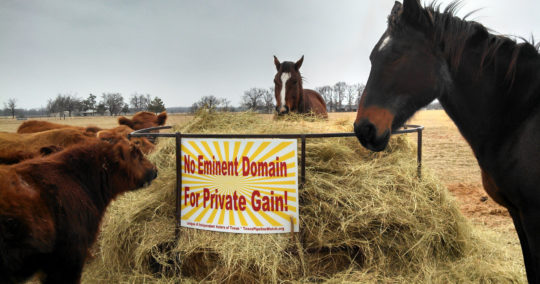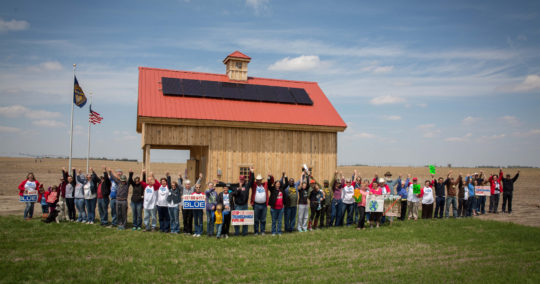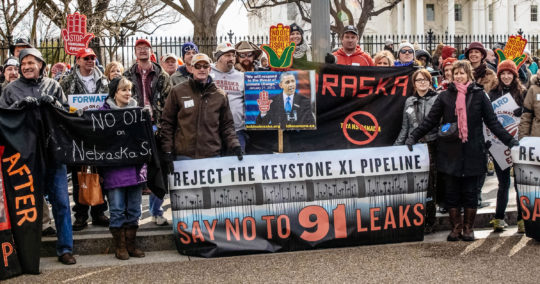If LB176 passes, allowing for the vertical integration of the hog industry in Nebraska, the degradation of our state’s valuable and already threatened water resources will soon follow.
When State Senators, like Patty Pansing Brooks, argue that there will be time to institute state environmental laws to protect our water resources from dumping by new industrial agricultural facilities, they are wrong. Such laws should have already been enacted given that the largest water polluters in the state of Nebraska are already Tyson Foods, which dumps more than 4.2 million pounds of toxic materials into the Missouri River, and Cargill Meat Solutions, which dumps more than 3.7 million pounds of toxic materials into the Platte.
“Wasting Our Waterways,” a report prepared by the Environment America Research and Policy Center in 2012, found that Nebraska ranked fifth in the nation for highest amount of total toxic discharges—and estimated that slaughterhouses and poultry plants were responsible for about one-third of all direct discharges in Nebraska and associated barns accounted for another third. The Lower Platte River, the main source of drinking water for Lincoln and a major source for Omaha, ranked as the sixth most contaminated river in the United States.
The other half of Omaha’s water supply currently comes from the Missouri River, and Lincoln approved a plan in 2014 to expand its available water supply by tapping into the Missouri as well.
A major portion of the current pollutants in the Missouri River originate from the Tyson meat packing plant in South Sioux City, Nebraska. And the levels may be much higher than reported. In 2009, the EPA fined Tyson $2 million for “numerous [unauthorized] discharges of fecal coliform and nitrite” into the Missouri.
Now Seaboard and Triumph Foods are building a new hog packing plant in Sioux City, Iowa—just across the state line from South Sioux City. It is slated to open in 2017.
When the State of Nebraska tallies pollutants that it is contributing to the water supply, nitrates and other contaminants from the Sioux City plant will not be included. Those contaminants will be considered Iowa pollution. This is important, because when state agencies try to regulate point source pollution, they will have no authority to regulate pollutants coming from across the river.
Shouldn’t we continue to protect our water resources and not add to the already dangerous levels of nitrates being added to our drinking water from surrounding states?
Although state environmental regulations can be put in place to regulate fecal waste from industrial chicken and hog facilities in Nebraska, those regulations will not control what surrounding states are allowing into our shared water resources. A decade ago, Iowa dismantled its ban on vertical integration. The companies that propose to develop industrial hog facilities in Nebraska are the very same companies that have driven the levels of nitrates so high in the Des Moines and Raccoon River watersheds in Iowa that the Des Moines Water Works has ongoing difficulty delivering water that is in compliance with the Clean Water Act. They finally filed suit against several counties in northwest Iowa to force them to better regulate discharges of nitrates from these giant animal-feeding operations into the waterways. The trial is set for this year.
And only two days ago, Republicans in the South Dakota state senate introduced a bill to change existing law so that “production of pork is subject to the same provisions which apply to livestock feeding, breeding stock, dairies, and poultry and egg operations.” That sounds benign, but it’s identical to LB176. It would make corporate hog ownership legal in South Dakota.
Almost the entirety of South Dakota surface water drains into the Missouri River watershed.
And, just as with Iowa, new Nebraska environmental laws will have no effect on companies who dump pollutants into the Missouri in South Dakota. Nebraska taxpayers will be left holding the massive bill to clean up our drinking water.
The pork packing plant in Sioux City is a done deal—and will have a significant impact on the nitrate loads in Omaha as soon as the plant opens. If we add in nitrate loads from South Dakota going into the Missouri, and nitrate loads from Nebraska going into the Platte, water quality issues in Lincoln and Omaha will soon be dire.
ACTION: If you haven’t already, please contact the following state senators and sign the petition against the corporate pigs:
- Sen. Heath Mello Phone: (402) 471-2710 / Email: hmello@leg.ne.gov
- Sen. Rick Kolowski Phone: (402) 471-2327 / Email: rkolowski@leg.ne.gov
- Sen. Patty Pansing-Brooks Phone: (402) 471-2633 / Email: ppansingbrooks@leg.ne.gov
- Sen. Burke Harr Phone: (402) 471-2722 / Email: bharr@leg.ne.gov
- Sen. Roy Baker Phone: (402) 471-2620 / Email: rbaker@leg.ne.gov
When you call and email these state senators, let them know that the passage of LB176 threatens your right to clean drinking water and that’s a risk you’re not willing to take. Make sure to send them some facts from this blog post!




